[Click on BLUE LINK for more information]
Think in the Morning posts a poem with a sample of napkin art on our Facebook Page every day. This is the 9th post on our website of accumulated poems. Other poems and links can be found HERE: Poems – 7
Tired And Unhappy, You Think Of Houses
Delmore Schwartz
Tired and unhappy, you think of houses
Soft-carpeted and warm in the December evening,
While snow’s white pieces fall past the window,
And the orange firelight leaps.
A young girl sings
That song of Gluck where Orpheus pleads with Death;
Her elders watch, nodding their happiness
To see time fresh again in her self-conscious eyes:
The servants bring in the coffee, the children go to bed,
Elder and younger yawn and go to bed,
The coals fade and glow, rose and ashen,
It is time to shake yourself! and break this
Banal dream, and turn your head
Where the underground is charged, where the weight
Of the lean building is seen,
Where close in the subway rush,
anonymous In the audience, well-dressed or mean,
So many surround you, ringing your fate,
Caught in an anger exact as a machine!
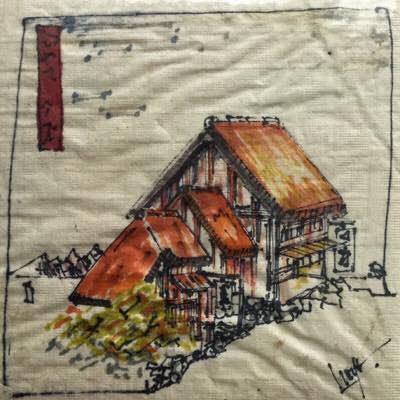
Sea Gull Cellar Bar Napkin Art, Jack Haye artist
The Art of Disappearing
Naomi Shihab Nye
When they say Don’t I know you?
say no.
When they invite you to the party
remember what parties are like
before answering.
Someone telling you in a loud voice
they once wrote a poem.
Greasy sausage balls on a paper plate.
Then reply.
If they say We should get together
say why?
It’s not that you don’t love them anymore.
You’re trying to remember something
too important to forget.
Trees. The monastery bell at twilight.
Tell them you have a new project.
It will never be finished.
When someone recognizes you in a grocery store
nod briefly and become a cabbage.
When someone you haven’t seen in ten years
appears at the door,
don’t start singing him all your new songs.
You will never catch up.
Walk around feeling like a leaf.
Know you could tumble any second.
Then decide what to do with your time.
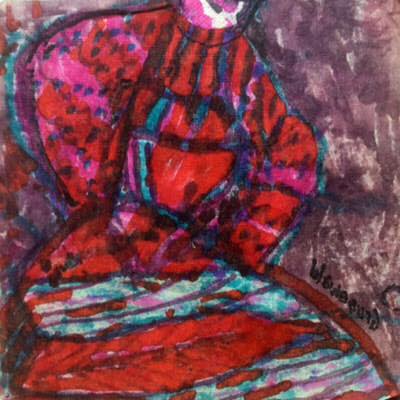
Sea Gull Cellar Bar Napkin Art, Estelle Grunewald artrist
Autumn
T. E. Hulme
A touch of cold in the Autumn night –
I walked abroad,
And saw the ruddy moon lean over a hedge
Like a red-faced farmer.
I did not stop to speak, but nodded,
And round about were the wistful stars
With white faces like town children.
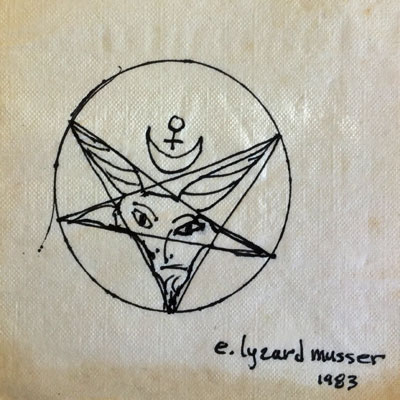
Sea Gull Cellar Bar Napkin Art, e. lyzard musser artist
Sweet Like a Crow
Michael Ondaatje
for Hetti Corea, 8 years old
The Sinhalese are beyond a doubt one of the least musical people in the world. It would be quite impossible to have less sense of pitch, line or rhythm. - Paul Bowles
Your voice sounds like a scorpion being pushed
through a glass tube
like someone has just trod on a peacock
like wind howling in a coconut
like a rusty bible, like someone pulling barbed wire
across a stone courtyard, like a pig drowning,
a vattacka being fried
a bone shaking hands
a frog singing at Carnegie Hall.
Like a crow swimming in milk,
like a nose being hit by a mango
like the crowd at the Royal-Thomian match,
a womb full of twins, a pariah dog
with a magpie in its mouth
like the midnight jet from Casablanca
like Air Pakistan curry,
a typewriter on fire, like a hundred
pappadans being crunched, like someone
trying to light matches in a dark room,
the clicking sound of a reef when you put your head into the sea,
a dolphin reciting epic poetry to a sleepy audience,
the sound of a fan when someone throws brinjals at it,
like pineapples being sliced in the Pettah market
like betel juice hitting a butterfly in mid-air
like a whole village running naked onto the street
and tearing their sarongs, like an angry family
pushing a jeep out of the mud, like dirt on the needle,
like 8 sharks being carried on the back of a bicycle
like 3 old ladies locked in the lavatory
like the sound I heard when having an afternoon sleep
and someone walked through my room in ankle bracelets.
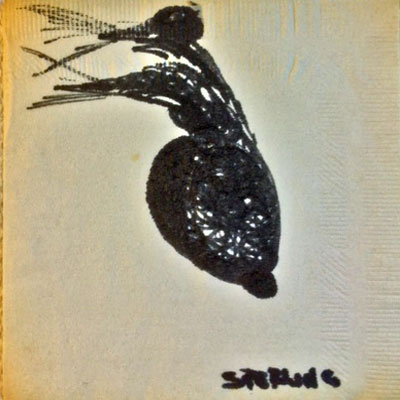
Sea Gull Cellar Bar Napkin Art, artist unknown
Proust’s Madeleine
Kenneth Rexroth
Somebody has given my
Baby daughter a box of
Old poker chips to play with.
Today she hands me one while
I am sitting with my tired
Brain at my desk. It is red.
On it is a picture of
An elk’s head and the letters
B.P.O.E.—a chip from
A small town Elks’ Club. I flip
It idly in the air and
Catch it and do a coin trick
To amuse my little girl.
Suddenly everything slips aside.
I see my father
Doing the very same thing,
Whistling “Beautiful Dreamer,”
His breath smelling richly
Of whiskey and cigars. I can
Hear him coming home drunk
From the Elks’ Club in Elkhart
Indiana, bumping the
Chairs in the dark. I can see
Him dying of cirrhosis
Of the liver and stomach
Ulcers and pneumonia,
Or, as he said on his deathbed, of
Crooked cards and straight whiskey,
Slow horses and fast women.
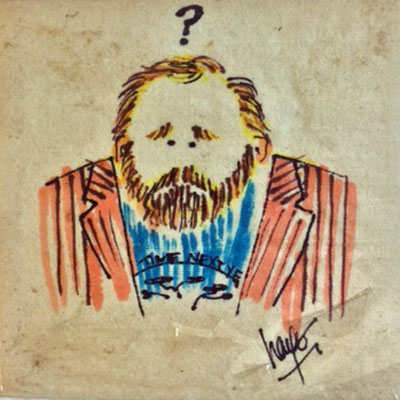
Sea Gull Cellar Bar Napkin Art, Jack Haye artist
Vacating an Apartment
Agha Shahid Ali
1.
Efficient as Fate,
each eye a storm trooper,
the cleaners wipe my smile
with Comet fingers
and tear the plaster
off my suicide note.
They learn everything
from the walls’ eloquent tongues.
Now, quick as genocide,
they powder my ghost for a cinnamon jar.
They burn my posters
(India and Heaven in flames),
whitewash my voice stains,
make everything new,
clean as Death.
2
When the landlord brings new tenants,
even Memory is a stranger.
The woman, her womb solid with the future,
instructs her husband’s eyes
to clutch insurance policies.
They ignore my love affair with the furniture,
the corner table that memorized
my crossed-out lines.
Oh, she’s beautiful,
a hard-nippled Madonna.
The landlord gives them my autopsy;
they sign the lease.
The room is beating with bottled infants,
and I’ve stopped beating.
I’m moving out holding tombstones in my hands.

Sea Gull Cellar Bar Napkin Art, James Maxwell artist
The Truth Teller
When I was five years old
I slipped into my brother’s bed
Or, he slipped into mine.
He will remember.
He remembers everything.
We used to lie in bed together and talk
About the grasshoppers I had killed
Or that story he told about the Albatross.
These are personal things
Hard to explain.
He made up a football game with colored paper squares
That we played together on the floor
Just the two of us.
Neither of us knew who would win until the fourth quarter
Because of the Hail Mary.
Once he hit me with a rock and I ran bleeding.
When he got to me I was still crying.
He put his hand on my forehead.
He says everything is okay.
I believe him.
He’s a truth teller.
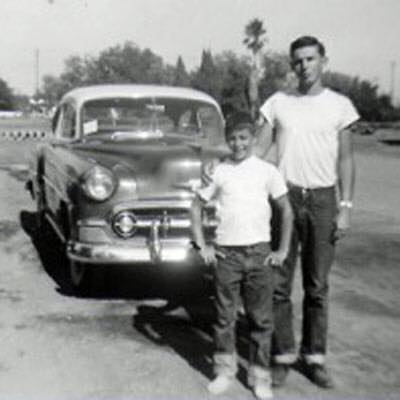
The Partial Explanation
Charles Simic
Seems like a long time
Since the waiter took my order.
Grimy little luncheonette,
The snow falling outside.
Seems like it has grown darker
Since I last heard the kitchen door
Behind my back
Since I last noticed
Anyone pass on the street.
A glass of ice-water
Keeps me company
At this table I chose myself
Upon entering.
And a longing,
Incredible longing
To eavesdrop
On the conversation
Of cooks.
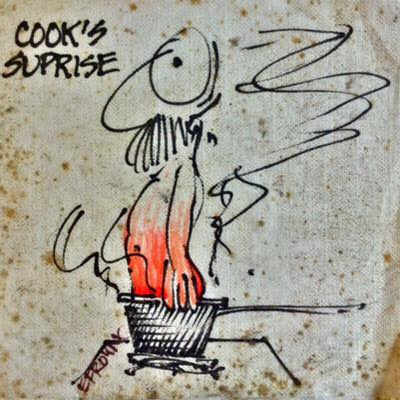
Sea Gull Cellar Bar Napkin Art, Efroym artist
Work Without Hope
Samuel Taylor Coleridge
All Nature seems at work. Slugs leave their lair —
The bees are stirring — birds are on the wing
– And Winter slumbering in the open air,
Wears on his smiling face a dream of Spring!
And I the while, the sole unbusy thing,
Nor honey make, nor pair, nor build, nor sing.
Yet well I ken the banks where amaranths blow,
Have traced the fount whence streams of nectar flow.
Bloom, O ye amaranths! bloom for whom ye may,
For me ye bloom not! Glide, rich streams, away!
With lips unbrightened, wreathless brow, I stroll:
And would you learn the spells that drowse my soul?
Work without Hope draws nectar in a sieve,
And Hope without an object cannot live.
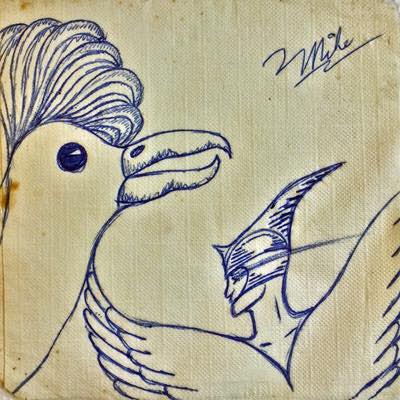
Sea Gull Cellar Bar Napkin Art, artist unknown
Leisure
William Henry Davies
WHAT is this life if, full of care,
We have no time to stand and stare?
— No time to stand beneath the boughs,
And stare as long as sheep and cows:
No time to see, when woods we pass,
Where squirrels hide their nuts in grass:
No time to see, in broad daylight,
Streams full of stars, like skies at night:
No time to turn at Beauty’s glance,
And watch her feet, how they can dance:
No time to wait till her mouth can
Enrich that smile her eyes began?
A poor life this if, full of care,
We have no time to stand and stare.
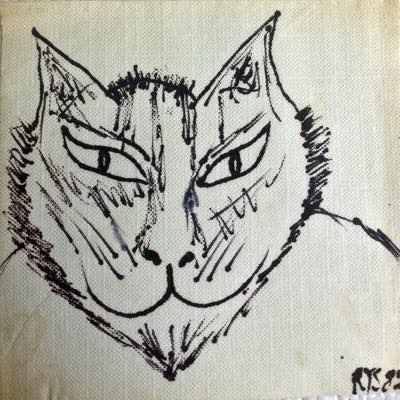
Sea Gull Cellar Bar Napkin Art, RTS artist
In the Insect Room
Gillian Clarke
A drawer of butterflies,
each impaled on the tiny stilt of its pin,
as numerous as those quivering, alive
in the colonies on Cors Llawr Cwrt, larvae
that live on Devil’s Bit Scabious on the bog.
They hunger, eat, belong, mate, breed and die.
I love their language, pupae, chrysallis,
the coloured oculi that dot their wings,
their almost symmetry, their beauty
nourished on buttercup, betony, bugle,
sprung from the hoof-prints of grazing cattle
on wetland and marsh.
Though none here stir, they could be alive.
If I gaze long enough, they move.
Trapped like the Snowdon Lily when ice lost its grip
as loosening glaciers began to slip,
mountains gave way with a slow, deep groan,
scouring valleys from the tuffs and ash
of old upheavals, this creature went its own way
to survive on Snowdon’s western flanks
feeding on flowers of the wild thyme.
Genetically distinct, a jewel,
its elytra striped with emerald, copper, gold,
precious metals of the mountain’s heart,
blue of the inky llyn, the colour of slate
in rain.
What’s beauty for, but to disguise
a beetle as a waterdrop to hold
Snowdonia in a carapace of gold?
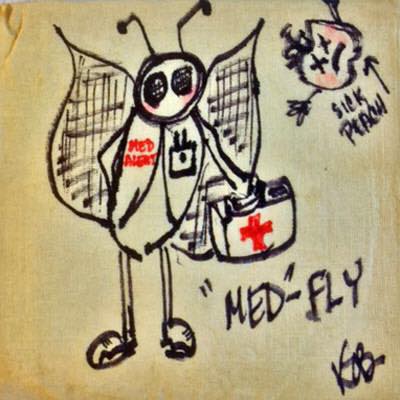
Sea Gull Cellar Bar Napkin Art, Karen Kessler artist
Renegade
Kate Tempest
Before We Were Born
Nikola Madzirov
(translated by Peggy and Graham W. Reid)
The streets were asphalted
before we were born and all
the constellations were already formed.
The leaves were rotting
on the edge of the pavement,
the silver was tarnishing
on the workers’ skin,
someone’s bones were growing through
the length of the sleep.
Europe was uniting
before we were born and
a woman’s hair was spreading
calmly over the surface
of the sea.
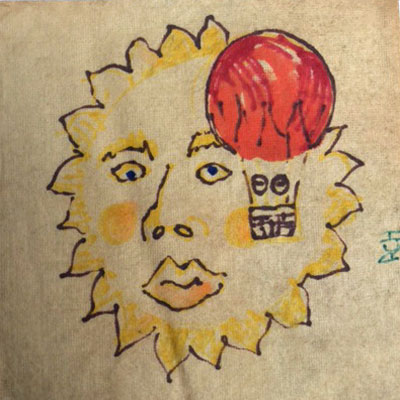
Sea Gull Cellar Bar Napkin Art, Roy Hoggard artist
The Past
Ha Jin
I have supposed my past is part of myself.
As my shadow appears whenever I’m in the sun
the past cannot be thrown off and its weight
must be borne, or I will become another man.
But I saw someone wall his past into a garden
whose produce is always in fashion.
If you enter his property without permission
he will welcome you with a watchdog or a gun.
I saw someone set up his past as a harbor.
Wherever it sails, his boat is safe
— If a storm comes, he can always head for home.
His voyage is the adventure of a kite.
I saw someone drop his past like trash.
He buried it and shed it altogether.
He has shown me that without the past
one can also move ahead and get somewhere.
Like a shroud my past surrounds me
but I will cut it and stitch it,
to make good shoes with it,
shoes that fit my feet.
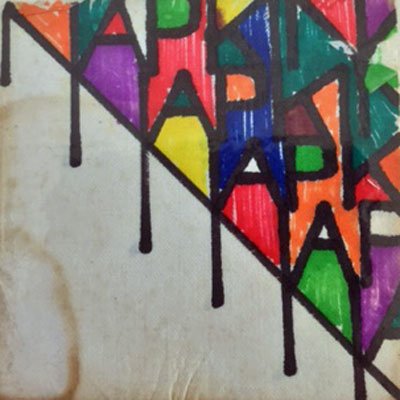
Sea Gull Cellar Bar Napkin Art, artist unknown
Night
Wojciech Bonowicz
A poem
from the start closes you up in itself.
It doesn’t want
you to look around to search
for other words
from other poems.
You sit on the corner of the stone
folded
like a sheet of paper.
Helpless agreeing
you don’t breathe. The poem
doesn’t allow it.
On the stone you cannot
wriggle use
a bed a clock a map
or all the rest
of the imagination.
A poem
has its own imagination.
It built it for itself in you
and then closed
to release itself.
You have to wait
on the corner of the stone
where sometimes a light flashes
the golden dust of hope.
In the end a poem
will open itself. The stone
lets you go: a sheet of paper
that begins to breathe.
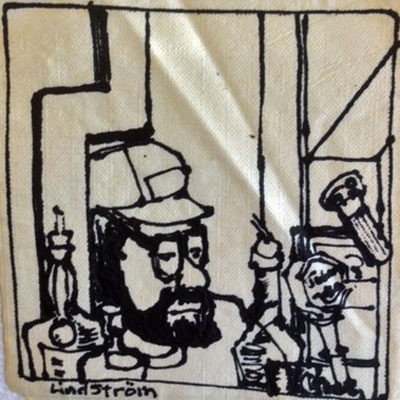
Sea Gull Cellar Bar Napkin Art, Sandra Lindstrom artist
The Frog and the Golden Ball
Robert Graves
She let her golden ball fall down the well
And begged a cold frog to retrieve it;
For which she kissed his ugly, gaping mouth –
Indeed, he could scarce believe it.
And seeing him transformed to his princely shape,
Who had been by hags enchanted,
She knew she could never love another man
Nor by any fate be daunted.
But what would her royal father and mother say?
They had promised her in marriage
To a cousin whose wide kingdom marched with theirs,
Who rode in a jeweled carriage.
‘Our plight, dear heart, would appear past human hope
To all except you and me: to all
Who have never swum as a frog in a dark well
Or have lost a golden ball.’
‘What then shall we do now?’ she asked her lover.
He kissed her again, and said:
‘Is magic of love less powerful at your Court
Than at this green well-head?’
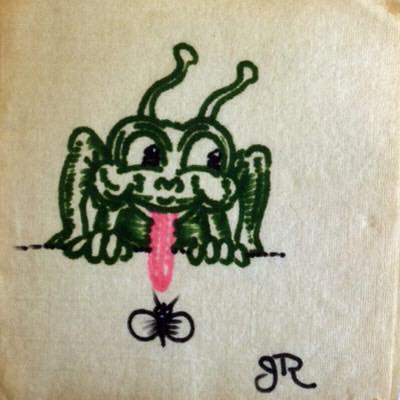
Sea Gull Cellar Bar Napkin Art, GR artist
Written by Himself
Gregory Pardlo
I was born in minutes in a roadside kitchen a skillet
whispering my name. I was born to rainwater and lye;
I was born across the river where I
was borrowed with clothespins, a harrow tooth,
broadsides sewn in my shoes. I returned, though
it please you, through no fault of my own,
pockets filled with coffee grounds and eggshells.
I was born still and superstitious; I bore an unexpected burden.
I gave birth, I gave blessing, I gave rise to suspicion.
I was born abandoned outdoors in the heat-shaped air,
air drifting like spirits and old windows.
I was born a fraction and a cipher and a ledger entry;
I was an index of first lines when I was born.
I was born waist-deep stubborn in the water crying
ain’t I a woman and a brother I was born
to this hall of mirrors, this horror story I was
born with a prologue of references, pursued
by mosquitoes and thieves, I was born passing
off the problem of the twentieth century: I was born.
I read minds before I could read fishes and loaves;
I walked a piece of the way alone before I was born.
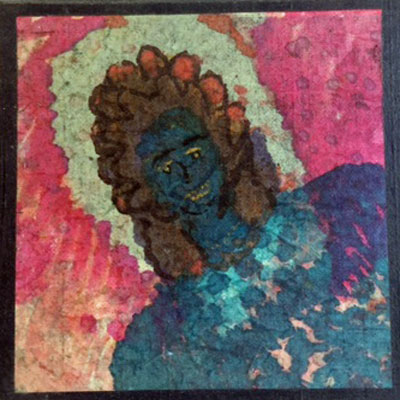
Sea Gull Cellar Bar Napkin Art, Estelle Grunewald artist
We Die
Diane Akerman, for Carl Sagan
We die despite appointments and feuds,
while our toddler,
who recently learned to say No,
opens and shuts drawers
a hundred times a day
and our teen braces
for the rapids of romance.
We die despite the contracts
and business trips we planned,
when our desk is untidy,
despite a long list of things to do
which we keep simmering
like a pot of rich broth.
We die despite work we cherish,
marrying whom we love,
piling up a star-spangled fortune,
basking on the Riviera of fame,
and achieving, that human participle
with no known object.
Life is not fair, the old saw goes.
We know, we know, but the saw glides slow,
one faint rasp, and then at length another.
When you died, I felt its jagged teeth rip.
Small heartwounds opened and bled,
closing as new ones opened ahead.
Horror welled, not from the how but the when.
You died at the top of your career,
happy, blessed by love, still young.
Playing by evolution’s rules, you won:
prospered, bred, rose in your tribe,
did what the parent gods and society prized.
Yet it didn’t save you, love or dough.
Even when it happens slow, it happens fast,
and then there’s no tomorrow.
Time topples, the castle of cards collapses,
thoughts melt, the subscription lapses.
What a waste of life we spend in asking,
in wish and worry and want and sorrow.
A tall man, you lie low, now and forever
complete, your brilliant star eclipsed.
I remember our meeting, many gabfests ago,
at a crossroads of moment and mind.
In later years, touched by nostalgia,
I teased: “I knew you when
you were just a badly combed scientist.”
With a grin, you added: “I knew you when
you were just a fledgling poet.”
Lost friend, you taught me lessons
I longed to learn, and this final one I’ve learned
against my will: the one spoken in silence,
warning us to love hard and deep,
clutch dear ones tighter, ransom each day,
the horror lesson I saw out of the corner of my eye
but refused to believe until now: we die.
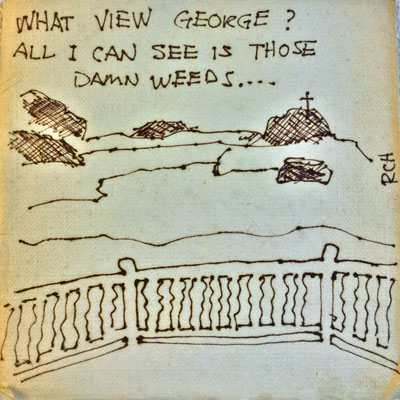
Sea Gull Cellar Bar Napkin Art, Roy Hoggard artist
Ermita in the Rain
Angela Manalang Gloria
It is not the rain that wanly
Sobs its tale across the bay,
Not the sobs of lone acacias
Trembling darkly in the gray,
Not the groans of harried breakers
Flinging tatters on the shore,
But the phantom of your voice that
Stays me dreaming at my door.
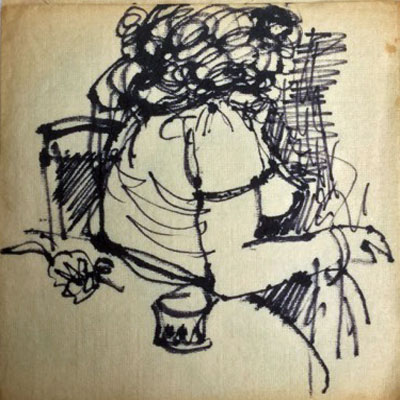
Sea Gull Cellar Bar Napkin Art, artist unknown
The Way Through the Woods
Rudyard Kipling
They shut the road through the woods
Seventy years ago.
Weather and rain have undone it again,
And now you would never know
There was once a road through the woods
Before they planted the trees.
It is underneath the coppice and heath
And the thin anemones.
Only the keeper sees
That, where the ring-dove broods,
And the badgers roll at ease,
There was once a road through the woods.
Yet, if you enter the woods
Of a summer evening late,
When the night-air cools on the trout-ringed pools
Where the otter whistles his mate,
(They fear not men in the woods,
Because they see so few.)
You will hear the beat of a horse’s feet,
And the swish of a skirt in the dew,
Steadily cantering through
The misty solitudes,
As though they perfectly knew
The old lost road through the woods …
But there is no road through the woods.
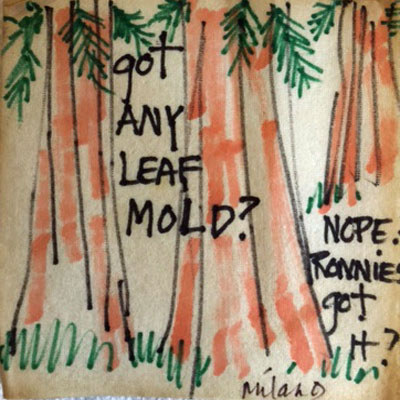
Sea Gull Cellar Bar Napkin Art, Nancy Milano
In a Dark Time
Theodore Roethke
In a dark time, the eye begins to see,
I meet my shadow in the deepening shade;
I hear my echo in the echoing wood–
A lord of nature weeping to a tree.
I live between the heron and the wren,
Beasts of the hill and serpents of the den.
What’s madness but nobility of soul
At odds with circumstance? The day’s on fire!
I know the purity of pure despair,
My shadow pinned against a sweating wall.
That place among the rocks–is it a cave,
Or a winding path? The edge is what I have.
A steady storm of correspondences!
A night flowing with birds, a ragged moon,
And in broad day the midnight come again!
A man goes far to find out what he is–
Death of the self in a long, tearless night,
All natural shapes blazing unnatural light.
Dark, dark my light, and darker my desire.
My soul, like some heat-maddened summer fly,
Keeps buzzing at the sill. Which I is I?
A fallen man, I climb out of my fear.
The mind enters itself, and God the mind,
And one is One, free in the tearing wind.
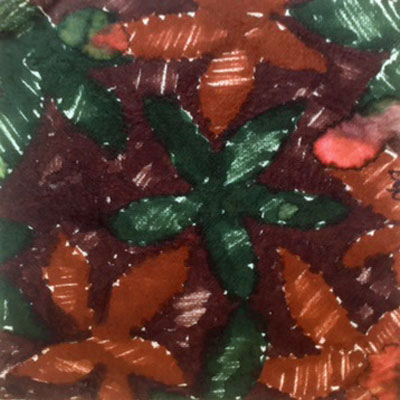
Sea Gull Cellar Bar Napkin Art, artist unknown

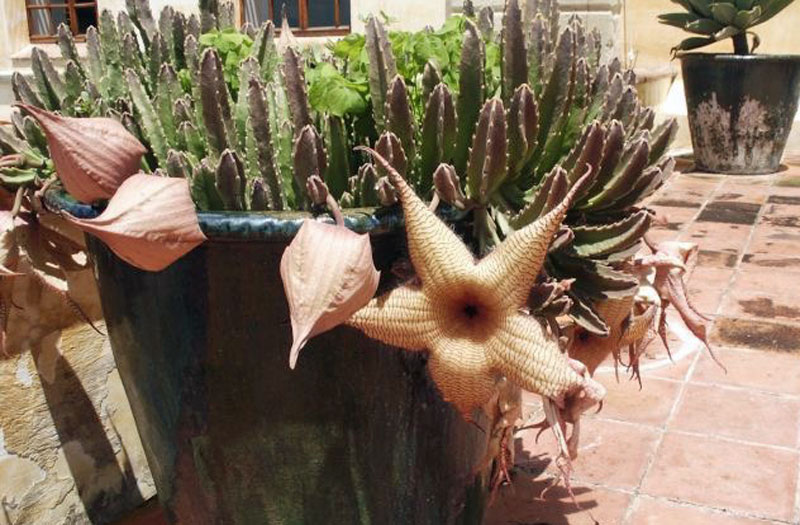
My older brother hit me in the head with a rock……
He’s be afraid to do that now…….
Brute !
Exceptionally superb collection today, David.
I recently read John Cheever’s COLLECTED STORIES all the way through from page 1. I didn’t skip around; I read them one after the other, from the front of the book to the back, in the order no doubt chosen by Cheever himself. The stories became chapters in a vast novel.
Same effect here with this selection. Together, turbocharged by the Napkin Art (great choices!), they read like one long sly poem.
“leaf mold” nakkin artist: Nancy Milano!
“MedFly” ~ UNKNOWN! (not K.R.)
This site is so COOOL!
Thanks David Herstle Jones!